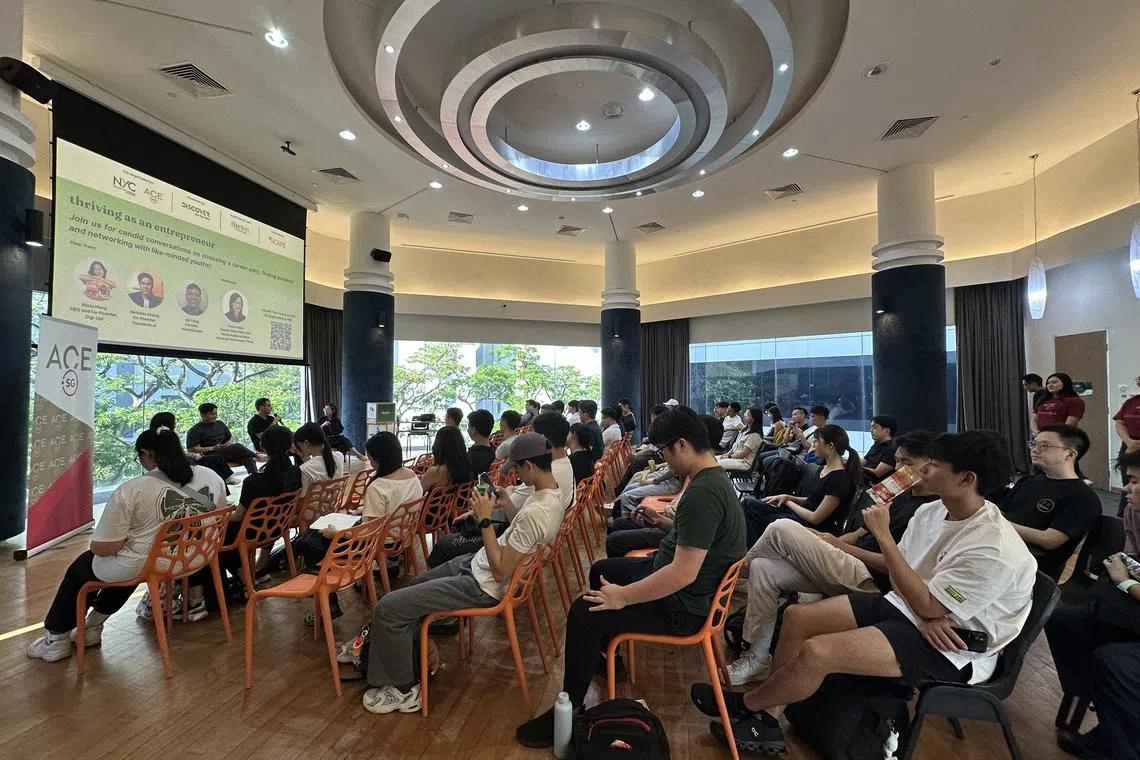Student years are the best time to test startup dreams, say young founders at fireside chat
At a panel discussion moderated by thrive, The Business Times’ young audience initiative, entrepreneurs share their take on the benefits of starting a business while in school

Straight to your inbox. Money, career and life hacks to help young adults stay ahead.
[SINGAPORE] Students toying with the idea of starting their own business are best poised to dip their toes while they are still in school, said panellists last Friday (Aug 22), at a fireside chat exploring entrepreneurship.
“University is the place for you to fail faster,” said panellist Nicholas Cheng, co-founder of Tracework.ai – a process documentation tool – and VideoPulse, a video animation company.
In school, you can commit to something for a period of time and if it does not work out, you can quickly switch to something else, he pointed out.
About 50 attendees were at the Thriving as an Entrepreneur fireside chat, held in partnership with thrive, the young audience initiative of The Business Times. The event at *Scape was co-organised by the Action Community for Entrepreneurship (ACE) and the National Youth Council (NYC) Singapore, and included a networking session.

Cheng was joined on the panel by Alicia Hong, CEO and co-founder of social enterprise Digi-Up! and Kit Yong, founder of Forte Biotech, which supplies tools to farmers across South-east Asia for sustainable farming. All three panellists started their entrepreneurship journey while they were in school.
Hong recommends taking part in hackathons and incubator programmes. Aspiring entrepreneurs can benefit from these structured programmes, where they are able to connect with potential co-founders, receive guidance from mentors and even access grants or venture capital from competitions, said the 20-year-old, who started her social enterprise while still studying in Singapore Polytechnic.
Navigate Asia in
a new global order
Get the insights delivered to your inbox.
“If you start by yourself, in your room, from the ground up… that is the toughest route you could ever choose to take,” she added.
Vivien Shiao, BT’s young audience editor and the moderator of the panel discussion, asked Forte Biotech’s Yong for his advice to those looking to drop out of school to pursue entrepreneurship full-time.
“Don’t,” was the answer. Having a degree or qualification will still serve as something to fall back on, he said.
“School was a good time to explore… to learn more,” Yong said. “When you start a business in school, others also tend to ‘give you face’ and take you more seriously – which helps especially when you are just starting out,” he added.
For students who are still undecided about entrepreneurship, startup internships are also valuable – even the unpaid ones “just to get your hands dirty”, Cheng said.
Interning at startup companies often allows students to curate their own learning experience, and reach for more opportunities to learn the ropes of starting a business – which normal internships may not offer, he noted.

Building a sustainable business
While having a distinctive business idea is important, the panellists concurred that this is not enough for a business to succeed. Instead, it is about striking a balance between purpose and profitability.
“When you make a business, and you don’t make money – then what are you doing it for...? It’s not called a business any more,” Hong said.
“I had to learn this the hard way,” she added. “We were willing to do the projects for free… but when you realise nothing is coming into (your) bank accounts other than (your) grant money... there’s something wrong.”
As entrepreneurs, setbacks or challenges are par for the course – the important thing is to learn from them, and respond accordingly.
Hong also struggled with investors not taking her seriously because of her age. Comments such as “you are too young” or “others wouldn’t believe you have the capabilities” were common, she told the audience.
“It pushes me to surround myself with people who actually believe in me,” Hong said.
Cheng observed that people are generally more inclined to work with those with whom they feel familiar.
Looking back on his experience working abroad, he spoke on how he had to adjust his mannerisms and accent in order to establish more overseas connections for his startup, VideoPulse. “Sometimes you just have to adapt,” he noted.
Building relationships and socialising also lays the foundation for establishing rapport as an early stage startup, “which honestly, I hate to the core”, Yong told the audience frankly.
Despite that, he acknowledged the importance of networking and demonstrating to potential connections that you have a steady footing – not just for personal credibility but for the sake of the business as well.

The entrepreneurial path
“Ultimately, if my business can help others – be it one or a thousand people – I feel like I’ve done something good in my life, and I think that is what truly drives me,” Yong said.
He was candid about how tough the journey is as an entrepreneur, adding that at times he has nightmares over not producing a good product or going into debt – which he described as “realistic fears” for many entrepreneurs.
“I do think that is a very stressful job,” Yong said, adding that it is not uncommon for business owners to experience mental health challenges.
On that, he encouraged those feeling overwhelmed or distressed to seek professional support – a sentiment echoed by Cheng.
Thriving as an entrepreneur might mean being “delusional enough” to start something, but one needs to temper optimism with being realistic, he added.
Cheng also pointed out that there will always seem to be someone doing better. One’s benchmark will keep shifting if one is not clear about goals.
Since founding two startups, he has learnt to work with clarity and purpose, and avoid taking on more than he can manage.
Young people tend to view entrepreneurship as a means to escape 9 to 5, but the realities of running your own business often means you have to do more – sometimes even working from 8 am to 4 am, Hong said.
“It’s not true when they say: when you have passion, it feels like you don’t work a day,” she added.
“The age that you’re at now… you don’t have bills to pay, you don’t have mouths to feed. So it’s the best time to... fail, try, succeed, anything at all – and then learn from your lessons, and learn from your mistakes.”
To keep up to date on future events on navigating money, career and life as young adults, subscribe to thrive’s free newsletter or follow thrive on TikTok and Instagram. thrive is the young audience initiative of The Business Times.
Decoding Asia newsletter: your guide to navigating Asia in a new global order. Sign up here to get Decoding Asia newsletter. Delivered to your inbox. Free.
Copyright SPH Media. All rights reserved.


